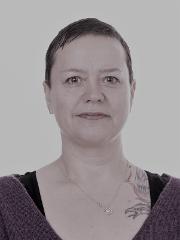Mørketid
Foto: Ellen Kathrine BluddJørgen Berge
Prorektor for forskning og utvikling
Enhet: Fellesadministrasjonen
Arktisk marinbiologi, polarnatt, dyreplankton, organismer tilknyttet drivisen i polhavet, effekter av klimaendringer
Oddgeir Friborg
Professor - Leder Forskningsgruppe Helsepsykologi
Enhet: Institutt for psykologi
Helsepsykologi, resiliens, klinisk psykologi, søvn og døgnrytmer, psykometri, strukturelle ligningsmodeller, vekstmodeller, latente klasseanalyser, statistisk modellering generelt.
David Hazlerigg
Professor in Arctic Chronobiology and Physiology
Enhet: Institutt for arktisk og marin biologi
Circannual rhythms, Photoperiodism, Neuroendocrinology, Developmental programming, Comparative physiology.
Laila Arnesdatter Hopstock
Professor, Instituttleder (Institutt for helse- og omsorgsfag)
Enhet: Institutt for helse- og omsorgsfag
Kardiometabolsk helse og risikofaktorer
Overvekt, kosthold og fysisk aktivitet
Hjerte- og karsykdom
Sekundærforebygging etter hjerteinfarkt
Aldring
Vebjørn Jacobsen Melum
Rådgiver
Enhet: Senter for hav og Arktis
Hvordan påvirker lyset dyr og mennesker i nord? Hvordan holder dyr styr på tiden? Interessert i biologiske rytmer, årsrytmer, døgnrytmer. Fysiologiske tilpasninger hos dyr som bor i Arktisk.
Kronobiologi, fysiologi, nevrobiologi, termoregulering, dvale, klimaendringer

Eva Therese Næss
Underviser i klinisk psykologi og profesjonsforberedende.
Enhet: Institutt for psykologi
Interessert i klinisk forskning; traumepsykologi, mindfulness-baserte intervensjoner og terapeututvikling.
Catharina Elisabeth Arfwedson Wang
Professor og psykologspesialist, forskningsgruppeleder
Enhet: Institutt for psykologi
Forskningsinteresser er knyttet til klinisk psykologisk fagutvikling og praksisnære tema.
Vitenskapelige arbeider dekker et bredt spekter av aktiviteter innen depresjonsforskning, psykisk helse hos barn og unge, perinatal psykisk helse, psykiske traumer, medisinsk uforklarte symptomer, forebygging, lavterskeltilbud, mestringsgrupper og psykoterapi. Jeg arbeider både med kvantitative og kvalitative forskningsmetoder.
Hovedinteresser er a) depresjon og kognitiv sårbarhet, b) psykisk helse hos barn og unge, c) klinisk sped- og småbarnspsykologi, d) perinatal psykisk helse, e) psykiske traumer, d) psykosomatiske tilstander/ medisinsk uforklarte fysiske symptomer, e) klinisk helsepsykologi, f) behandlingsforskning, forebygging, og tidlig intervensjon, g) visuelle metoder i forskning og behandling, h) lærings- og mestringsgrupper, i) brukermedvirkning og samhandling, og j) allmennrettet formidling av forskningsbasert kunnskap.
Nettsider til forsknings- og fagutviklingsprosjekter som jeg er eller har vært prosjektleder for:
1. Depresjon og kognitiv sårbarhet
3. Psykhjelpen (nettsiden er nedlagt)
Selvhjelpsbok:
1. Babyblues
Shona Wood
Associate professor in Arctic chronobiology and physiology
Enhet: Institutt for arktisk og marin biologi
Accurate timing and anticipation of seasonal changes is required to initiate physiological adaptations over the course of the year such as hibernation, changes in metabolism, fattening and reproductive activity. To achieve this, organisms have evolved complex seasonal timekeeping systems that rely on day length sensing (photoperiodism), coupled to innate long-term timers ("circannual clock"). The fundamental biological processes giving rise circannual rhythms are not known for any organism. This is a highly integrative topic of wide relevance, integrating multiple levels of understanding from genome to ecosystem. Within this area, my specific interests are:
- The cellular and molecular mechanisms involved in seasonal timekeeping processes
- The adjustment of homeostatic set points in physiology (rheostasis)
- The function of a specialised cell type in the hypothalamus, the tanycyte, in the above processes
- The use of hibernation and maternal photoperiodic programming to investigate the above processes
Current projects:
- Arctic seasonal timekeeping initiative (ASTI), role: Deputy director
ASTI is a capacity-building project to establish UiT as a centre of excellence for research into seasonal timekeeping mechanisms. This fills a strategic gap in chronobiology research worldwide, and is an excellent fit to UiT as the world’s northernmost research university. See the website for themes and specific research projects.
- Tromsø Forskningsstiftelse (TFS) starter grant: Epigenetic light, role: project leader
Website. The project aim was establish my lab in seasonal timekeeping and hibernation at the University of Tromsø. Specific areas of research were the epigenetic basis of seasonal timing, the role of circadian clocks in seasonal timekeeping, and maternal photoperiodic programming effects.
- Sentinel North Transdisciplinary Research Program Université Laval and UiT, The role of circadian clocks in seasonal synchrony in the Arctic, role: Co-PI
This is a comparative circadian/seasonal clockwork project with an emphasis on birds, fish and diatoms.
- Clocks and hypoxia: Linking oxygen to time, role: Co-PI
This is a project investigates the role of circadian clocks and hypoxia in a
diving mammal (hooded seal). It uses high-resolution respirometry of mitochondria, astrocyte/neuronal culture techniques, and lentiviral
reporters to unpick responses to hypoxia in a highly hypoxia-tolerant
animal.